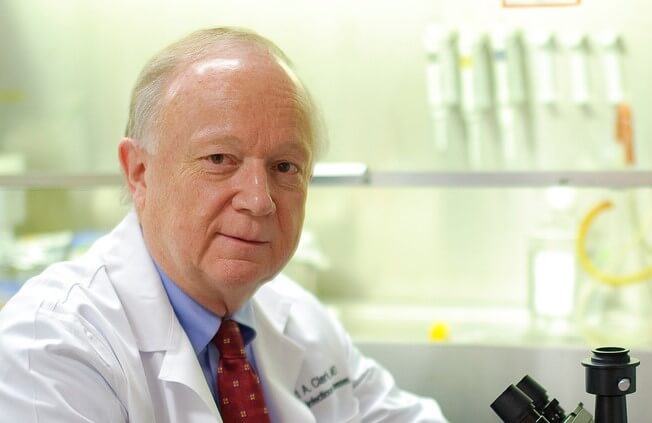As the U.S. Department of Veterans Affairs celebrates its 100th anniversary of Veterans Affairs research, it honors biomedical and behavioral scientists whose work exemplifies the Veterans Affairs’ century-long legacy of dedication and innovation in the service of veterans’ health.

Robert A. Clark, MD, professor of medicine and director of the Institute for Integration of Medicine and Science at The University of Texas Health Science Center at San Antonio (UT Health San Antonio) and South Texas Veterans Health Care System staff physician and investigator is a recipient of the William S. Middleton Award — the Veteran’s Affairs Biomedical Laboratory Research and Development Service’s highest honor for biomedical and behavioral investigators. The award was presented May 13 in Washington, D.C., during a ceremony recognizing six distinguished scientists.
This year’s Middleton Award winners include:
- Robert Clark, MD, South Texas Veterans Health Care System, San Antonio
- Arlan Richardson, PhD, Oklahoma City VA Health Care System, OK
The Middleton Award is given annually to senior Veterans Affairs investigators who have made outstanding research contributions that improves the lives and care of veterans. The award is named for William S. Middleton, MD, MACP, a former VA chief medical director who established the Veterans Affairs research program and it acknowledges both lifetime achievements and recent breakthroughs in biomedical and behavioral research that have significantly impacted veterans’ health.
“We are so pleased that Dr. Clark will be honored with the prestigious 2025 William S. Middleton Award for his impactful research and outstanding scientific contributions relevant to improving and advancing the health care of our veterans and all Americans. His over 40 years of unwavering commitment as a clinician, mentor and scientist at the VA truly merits this distinguished recognition,” said Amrita Kamat, PhD, associate chief of staff for research and development at the South Texas Veterans Health Care System.
Clark, a physician-scientist at UT Health San Antonio, was honored for his decades of research in infectious disease, inflammation and neurodegenerative diseases, especially those that disproportionately affect the veteran population.
Clark’s biomedical career spans more than five decades. He earned his medical degree from Columbia University and completed his postdoctoral fellowship in infectious diseases at the National Institutes of Health. His work with Veterans Affairs began in 1983, when he was recruited to head the Division of Infectious Diseases at the University of Iowa. The university has a close working relationship with Veterans Affairs and Clark accepted a position splitting his time between research for the university and Veterans Affairs. He moved to San Antonio in 1994, where he has served as a UT Health San Antonio faculty member and staff physician with the Audie L. Murphy Memorial Veterans Hospital and South Texas Veterans Health Care System. The Bartter Clinical Research Unit at Audie Murphy conducts veteran-focused research in collaboration with UT Health San Antonio.
“For all the work that I have done with Veterans Affairs, what comes first is veterans’ health. The VA supports research that has a clear connection to medical problems in the veteran population and holds the promise of making advances in terms of diagnosis and treatment,” said Clark.
In the early years of his work with Veterans Affairs, Clark’s research focused on host defenses against infection. This evolved into research on how neutrophils, a type of white blood cell, respond to infection and how they identify and destroy invading microbial pathogens. Clark and his team investigated potential treatments for individuals with disorders in which their neutrophils had either genetic or acquired defects that affected their ability to detect and kill pathogens.
After moving to San Antonio, he continued this research and expanded into cellular signal transduction using calcium as a mediator. A few years later, his lab welcomed two post-doctoral fellows with strong backgrounds in neuroscience. The team shifted their expertise in inflammation and host response toward a focus on the central nervous system, particularly inflammatory diseases of the brain. This led to Clark’s primary focus for the past 15 years on Parkinson’s disease.
“Inflammation is with us throughout our lives at some level or other. For many individuals, that trend becomes more pronounced in older age and there is a situation of chronic inflammation that can aggravate a wide variety of different health problems,” Clark said.
Factors such as chemical exposure or traumatic brain injury that affect some active-duty military members may predispose them to an increased risk of Parkinson’s disease later in life.
Clark said Veterans Affairs research has changed dramatically over the years, in both size and scope, but they remain focused on cutting-edge research that can directly improve veterans’ health.
“There’s always been a strong translational and clinical emphasis, but that feature is even more prominent in recent times in moving more research along the translational pathway that can result in novel forms of therapeutics,” he said.
Clark said he is humbled and honored to be counted among the esteemed scientists who have received the Middleton award.
“My involvement with Veterans Affairs has been such an important part of my career. I cannot imagine my career without having been so closely involved with Veterans Affairs. I appreciate everything my association with Veterans Affairs has allowed me to do,” said Clark.
Related stores:
UT Health San Antonio, 7 collaborators garner $46 million from NIH to move discoveries into practice
Aging reimagined: Study finds immune resilience counters key drivers of disease, mortality
UT Health San Antonio researchers planning clinical trial of potential Parkinson’s disease treatment

